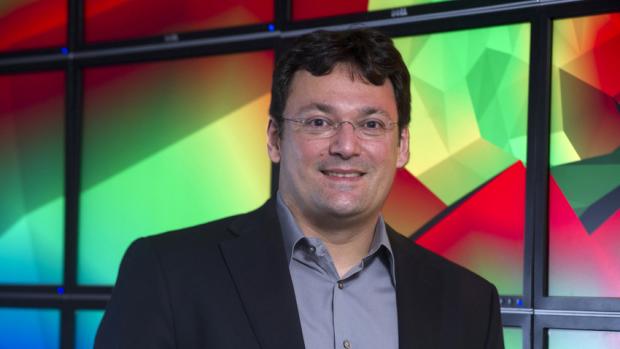NYU Professor Wins Premier Award in the Data Visualization Field
IEEE Honors Claudio Silva for Seminal Contributions to the Emerging Field Known as ‘Data Science’

The Institute of Electrical and Electronics Engineers’ (IEEE) presented the 2014 Visualization Technical Achievement Award to Claudio Silva, a professor in the Department of Computer Science and Engineering at the NYU Polytechnic School of Engineering and the head of disciplines at the university’s Center for Urban Science and Progress.
The award is one of the highest honors given by the IEEE Computer Society’s Technical Committee on Visualization and Graphics (VGTC). Silva was recognized for his seminal contributions to data visualization and analysis, popularly known as “Data Science,” at the IEEE VIS 2014 conference, held November 9-14, 2014 in Paris.
The awards committee singled out for special mention his contributions to geometric computing methods in visualization and to the development of VisTrails (jointly with Professor Juliana Freire and their students), a revolutionary, open-source data-exploration system that is now widely used across numerous scientific domains.
VisTrails systematically maintains provenance for the data exploration process by capturing all the steps researchers follow in the course of an experiment.—much like document-tracking applications in Microsoft Word and Google Docs track changes to a document. Tracking provenance is essential because that information allows a researcher to accurately reproduce his or her own results or the results of others, even if they involve hundreds of parameters and complex data sets.
“Consider that when a researcher is engaged in an exploratory process, working with simulations, data analysis, and visualization, for example, very little is repeated during the analysis process; change is the norm, and new workflows are constantly being generated,” Silva explained. “VisTrails manages these rapidly evolving workflows. To make a simple analogy, using it is like having someone in the lab watching over your shoulder and taking concise notes.”
The committee further cited Silva’s participation in numerous interdisciplinary projects across domains such as biotechnology, neuroscience, physics, ornithology, environmental science, and urban science. For example, he has worked with researchers who analyze EEG signals in order to determine the most understandable visual representation of the brain under various cognitive loads. He is also engaged in a project to analyze microbiome data collected around New York City.
“In addition to being at the forefront of the data visualization field, Claudio Silva is doing the highly collaborative, cross-disciplinary work that we value so highly at the NYU Polytechnic School of Engineering,” said Katepalli Sreenivasan, president and dean of engineering. “He provides solid evidence that engineers are making vital contributions in a wide variety of fields and that obtaining an engineering education is an invaluable way to make a positive impact on the world.”
“Claudio Silva has blazed a trail of innovation in visualization that has strongly influenced many researchers, including myself,” said Amitabh Varshney, director of the IEEE Visualization and Graphics Technical Committee and a professor of computer science and the director of the Institute for Advanced Computer Studies at the University of Maryland. “One of the reasons his work has had such a significant impact is because it combines elegant foundational research with real-world applications. This award is a well-deserved recognition of Claudio's illustrious accomplishments and stunning impact.”
Silva has published more than 200 peer-reviewed journal and conference papers, won a dozen “Best Paper Awards,” and holds 12 U.S. patents. An IEEE Fellow, he has garnered four IBM Faculty Awards and has been the recipient of grants from the National Science Foundation, the Department of Energy, the National Institutes of Health, the Alfred P. Sloan Foundation, the Gordon and Betty Moore Foundation, and others.
VGTC promotes research in computer graphics, visualization, and virtual reality, as well as the application of these topics to science, engineering, business, and the arts. The IEEE VGTC Visualization Technical Achievement Award, established in 2004, is awarded each year to an individual for a seminal technical achievement in visualization.




